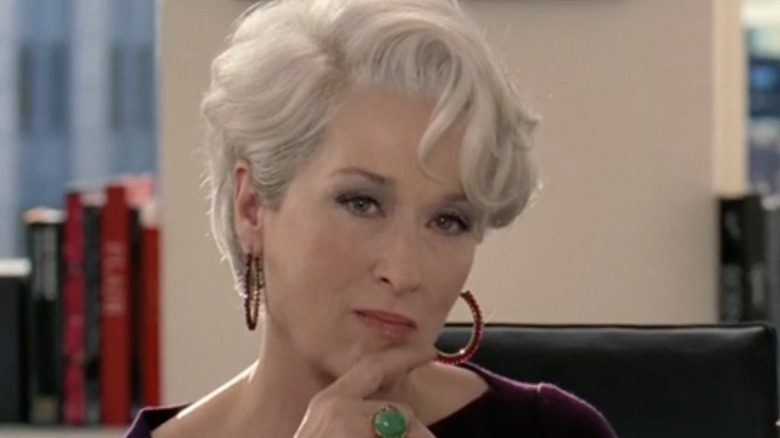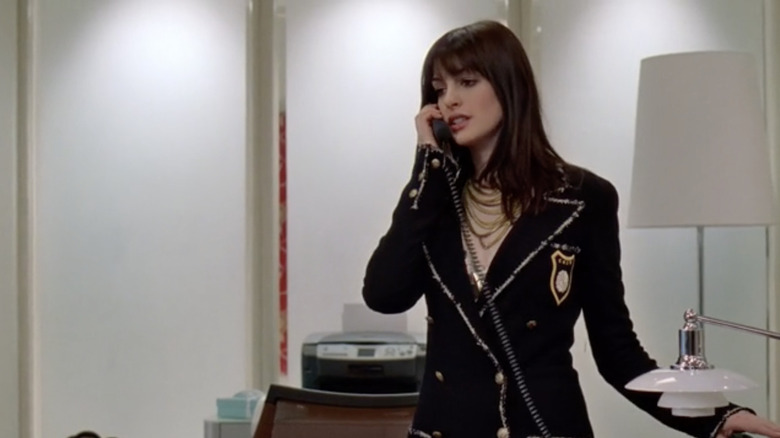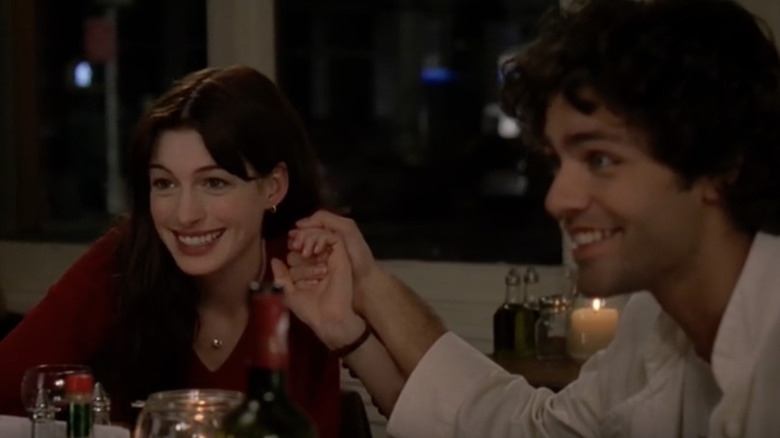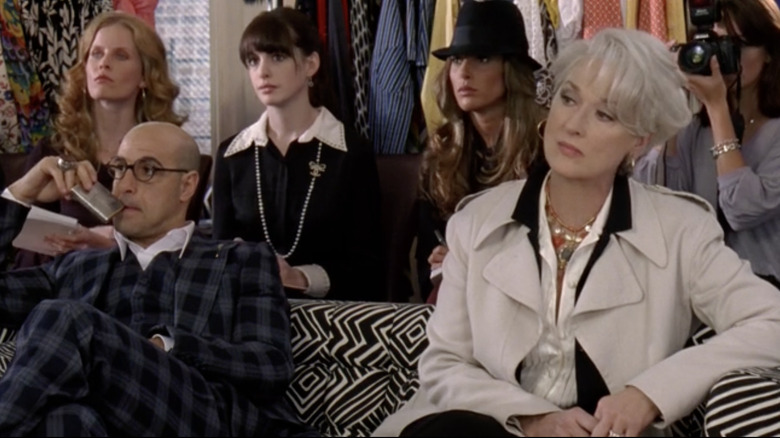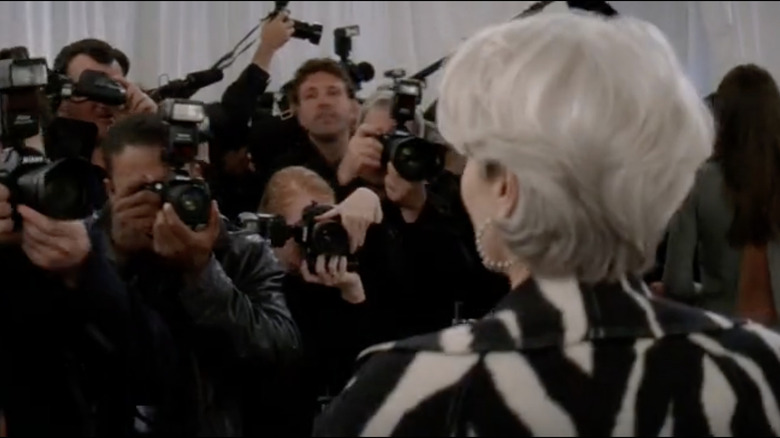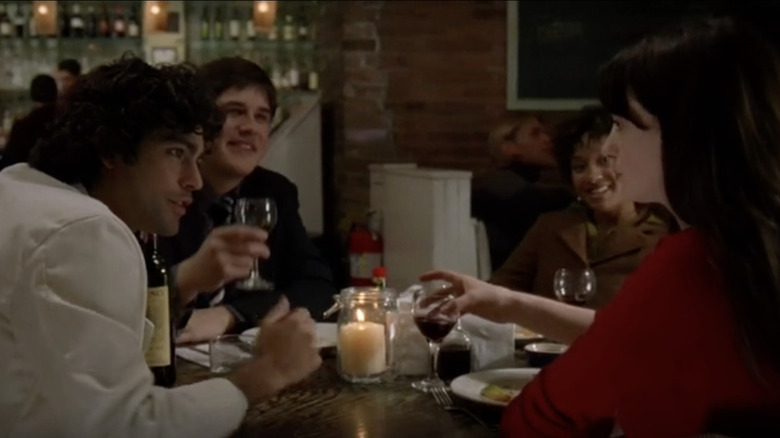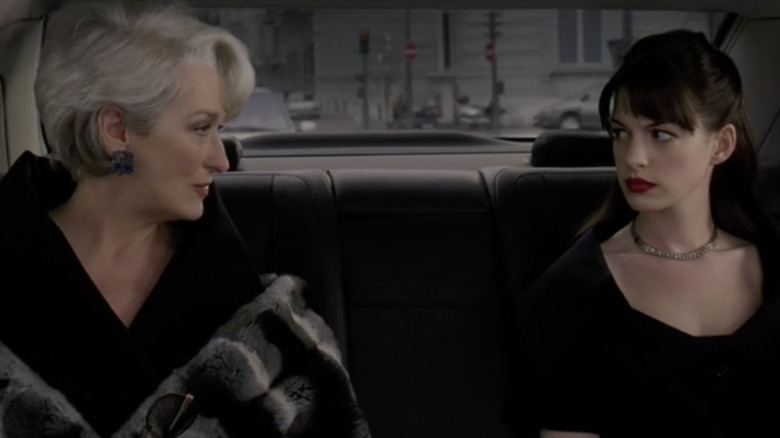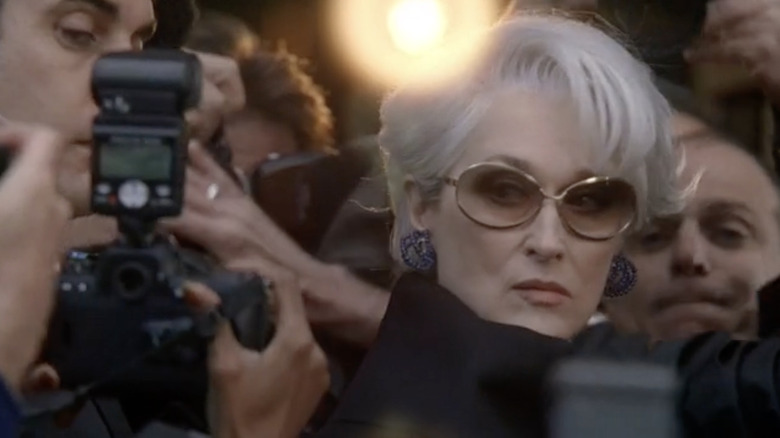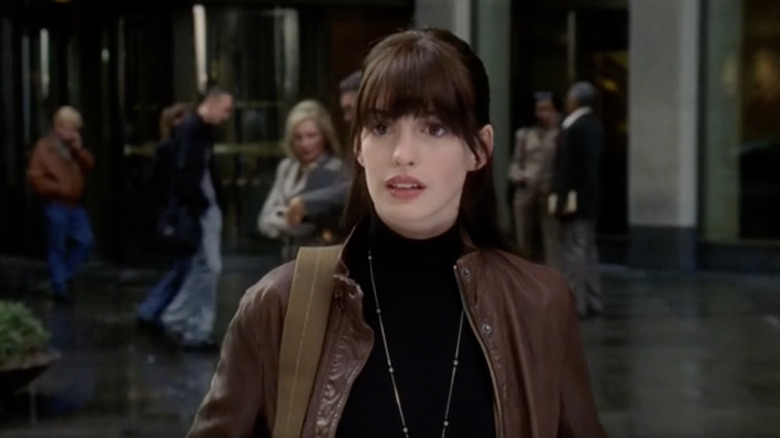How The Devil Wears Prada Differs From The Book
"The Devil Wears Prada?" For Spring? Groundbreaking.
In 2006, Aline Brosh McKenna immersed audiences in the extravagant world of fashion and publishing in New York City with her writing of the cult classic movie "The Devil Wears Prada." However, author Lauren Weisberger truly paved the way for this Academy Award nominated film with her New York Times bestselling novel of the same name, which acted as a fictional retelling of her time working as an assistant to Vogue editor-in-chief Anna Wintour. The story follows Andrea "Andy" Sachs (Anne Hathaway), a would-be journalist hoping to eventually leverage an assistant position at elite fashion magazine Runway into a writing job somewhere like The New Yorker. She receives a rude awakening when she butts heads with her tyrant boss, editor-in-chief Miranda Priestly (Meryl Streep), whose icy demeanor earned her the title of "Snow Queen," among others.
Andy discovers that the job "a million girls would kill for" is not quite as straightforward as she thought it would be, prompting her to fundamentally change aspects of appearance and personality to survive in the world of high fashion. With a stacked cast of names like Stanley Tucci, Emily Blunt, and Adrian Grenier, director David Frankel seamlessly brought Weisberger's story to the big screen. The film also features many cameos from prominent runway models and fashion magnates such as Heidi Klum, Gisele Bündchen, Valentino Garavani, Nigel Barker, Bridget Hall, and more.
While McKenna utilized many aspects of the novel, she also made several creative alterations to the overall story, as the screenplay was already in progress when the book was initially published (via Variety). One of the major differences between the two is that the film delves into the fashion industry on a larger scale while the novel centers more on Andy's personal growth. Read on to discover the additional ways that "The Devil Wears Prada" veers from its source material.
Personality Differences
In the film adaptation, Andy Sachs tends to be quiet, polite, and very hard working. However, the book frames Andy as more of a strong-willed, somewhat snarky young woman who smokes cigarettes and swears often. While movie Andy would tackle any project put in front of her, novel Andy seems to think she is above it all, and some readers claimed she exhibited the same snobbery she despises in others. In the novel, Andy comes to Runway fresh from traveling around the globe, gaining life experience to apply to her career. In contrast, the film shows Andy joining Runway right out of college, indicating that she has a great deal less life and cultural experiences to pull from.
Readers also pointed out that the novel's Emily shows more empathy and kindness to Andy when she first arrives at Runway. While many loved Emily Blunt's interpretation of the snooty senior assistant, it would have been great to see more of this friendship in the film. Fans have since tracked down the former senior assistant who Emily was loosely based on.
Stylist Leslie Fremar once acted as Anna Wintour's assistant at Vogue. "It took a lot of figuring it out and some sink-or-swim moments, but it was amazing," she told Into the Gloss. She credited her time with Wintour as an experience that changed who she is (via Coveteur), stating, "I honestly believe that if I didn't work for her I wouldn't be as successful or hard working as I am." Fremar has also been outspoken about her on-screen character, claiming that, although bits of the film were amplified, some of it was true to life.
Andy's relationship
A major plot point throughout "The Devil Wears Prada" film is the strained connection between Andy and her boyfriend, Nate. In the book, his name is Alex and he has a completely different career. While these are small details in the grand scheme of the story, the novel also contains many differences in the couple's relationship. Though they live together in the movie, their literary counterparts do not, as Andy lives with two female roommates. While Nate has grown to be detested by audiences for his lack of respect regarding Andy's career, Alex exhibits much more patience and appreciation for Andy's current work situation.
As Andy's work life amps up, her home life suffers and she misses countless outings and events, including her boyfriend's birthday party. This culminates with Andy missing a pre-planned trip with him in order to go to Paris Fashion Week, leading him to break up with her. The film, on the other hand, has Andy break up with him. Many fans found the moment to be much more poignant when Alex was the one doing the dumping, as it displayed that Andy's main support system had truly given up on her. The end of the film sees Andy and Nate meet up once again, giving the audience hope of a possible reconciliation between the two. However, in the novel, the relationship is clearly not salvageable, with the characters agreeing to friendship.
Characteristics
Anne Hathaway and her trademark brunette locks have grown to be synonymous with "The Devil Wears Prada." However, most likely to mirror her own appearance, Weisberger originally wrote Andy as a blonde. Hathaway was actually the ninth actress considered for the role, a list that included notable blondes like Scarlett Johansson, Kate Hudson, and Kirsten Dunst. The casting team's first choice was Rachel McAdams, who was fresh off the success of "Mean Girls" and "The Notebook," but who ultimately declined the part three times.
In contrast, Andy resonated with Hathaway, who pursued the role with determination. Former Fox president Elizabeth Gabler appreciated Hathaway's tenacity. "Annie never gave up. She never stopped campaigning, calling, she came into [Fox executive] Carla Hacken's office and wrote in her zen garden, 'Hire me,'" she explained to EW. Her determination eventually paid off with Meryl Streep giving the final stamp of approval.
In the film, Andy is a recent graduate of Northwestern University while the novel sees her graduate from Brown. Another striking difference are the nationalities of both Miranda and Emily. The book describes Miranda Priestly as British, with Emily Charlton hailing from the United States. The film adaptation swaps these origins, making Miranda American and Emily British. Many viewers believe this detail was changed during production to avoid heavy comparison to the Vogue boss she was loosely based off of.
Miranda Priestly's backstory
Meryl Streep managed to surpass all expectations with her portrayal of the notoriously critical fashion dictator. However, an aspect that many fans believe was significantly lacking in the film was background information on the character of Miranda Priestly. The book goes into great detail about Miranda's childhood and family life, lending some explanation as to what made her the complicated person she is today.
According to the novel, Miranda was born with the name Miriam Princhek to a large, poor family of Orthodox Jews. Her siblings decided to work blue collar jobs and marry young in order to start large families of their own, but Miriam had bigger plans. Upon turning seventeen, she promptly dropped out of high school to pursue an assistant job with a British designer while studying French in the evenings. Her family couldn't comprehend her determination and she slowly alienated herself from them in favor of her new glamorous life in fashion.
Several years later, Miriam leveraged her expertise into a job as a junior editor at Chic Magazine in Paris. Not long after this, Miriam legally changed her name to Miranda Priestly, notably leaving her family and former life behind to become a powerful socialite. From then on, Miranda's growth in the fashion industry was exponential and she never looked back. Raised in an impoverished family, Miranda vowed to never end up in a similar economic state again. This further proves that Miranda has no problem stepping over people on her road to the top, including friends and family. It also offers further context as to why it seems so easy for Miranda to betray Nigel, her closest confidant, to secure her own spot at the company.
Andy's friends
Though Andy's declining relationship with her friends takes somewhat of a backseat in the film, it is at the forefront of the book. While the film paints her friends as simply irritated by Andy's neglect, the novel dives deeper into the ways that Andy's new, all-encompassing job negatively affects her friends' lives. Andy's best friend, Lily, plays a fundamental role in her character development. Lily suffers from alcohol dependency and, as Andy begins to focus all of her attention on Miranda, Lily sinks deeper into alcoholism.
The worst comes when Andy is in Paris for Fashion Week. She receives word that Lily was involved in a reckless drunk driving accident that put her in a coma. This acts as a major turning point for Andy, who initially chooses not to come to her best friend's aid, instead keeping her commitment to Miranda. While the film leads viewers to take Andy's side in her issues with her friends, it's difficult to side with her book counterpart on this one. However, not long after this discovery, Andy is overcome with guilt and a sudden hatred for the position she finds herself in. Andy's prioritization of her friendship with Lily over work is what finally breaks her free of Runway's spell.
Paris Fashion Week
In "The Devil Wears Prada" film adaptation, a major turning point for Andy arrives when she betrays Emily by taking her spot working Paris Fashion Week. Despite the fact that she absolutely had a choice in the matter, Andy maintains that she was forced to take Emily's place by their boss. This decision is what ultimately drives Andy and Nate away from each other, and is a clear sign that Andy has joined the proverbial dark side. It also leads to the decline of her working relationship with Emily, who starved herself for months in preparation for Paris Fashion Week.
This situation unfolds differently in the book. In Weisberger's version of events, Emily actually contracts mono prior to Paris Fashion Week. Given that Emily is told by a doctor not to leave bed for three weeks, she is unable to make the international trip. After leaving word with Miranda, Emily informs Andy that she will take over the position in Paris for her. This moment leads to Andy and Alex's split, further emphasizing how Andy is beginning to isolate herself from her support system in favor of her career prospects.
Andy's escape from Runway
Who could forget the phone toss heard round the world? In one of the most empowering scenes of the film, Andy finally throws in the towel (or cell phone) and removes herself from the toxic environment that is Runway Magazine. The final straw for Andy comes when Miranda betrays her closest friend, Nigel, in order to secure her own spot at the magazine. In a heartbreaking scene, Nigel, who has worked alongside Miranda for decades, gets his dream job stolen right out from under his nose. Blinded by the glamourous lifestyle, Andy had begun to respect Miranda's point of view leading up to that moment. However, she realizes Miranda has no moral compass, representing to Andy exactly what she does not want to turn into.
The book, on the other hand, gives fans a long-awaited standoff between the two women. Following the traumatic accident involving Lily, Andy decides to stay in Paris as she has already committed to working alongside Miranda. When Miranda hears this, her callous response to the life-threatening situation further cements her as a "she-devil" in Andy's mind. But it is the next statement that shakes Andy to the core. Miranda shares that Andy reminds her of herself at her age, and Andy is swiftly overcome with nausea as she cannot accept that she is becoming like Priestly. From that moment on, the words ring in her ears until she is fed up with the abuse and decides to book a flight home, publicly cursing out Miranda in the process. She is fired immediately.
The ending
At the end of the film, viewers see Andy getting back on the right track. After leaving Runway, Andy sets up a meeting with Nate to discuss the possible future of their relationship in addition to the current positive trajectory of their careers. She goes on to nail an interview with a publication called The New York Mirror, who Miranda Priestly gave a surprisingly positive, if loaded, recommendation to. Andy eventually crosses paths with Miranda in the city one last time. It is clear from their respective expressions that there is a mutual respect between the two despite the fact that they are on completely different paths.
In the book version of "The Devil Wears Prada," Andy finally prioritizes her friends and family. Following Lily's drunk driving accident, she and Andy both move in with the latter's parents to get grounded and back on their feet. Andy and her ex-boyfriend do not rekindle their relationship like they do in the movie. In addition, Andy does not receive a full-time job in journalism, although she is optimistic and determined that she will be able to earn her dream position on her own merit.
The film creators understandably wanted to wrap up the movie in a rom-com bow, providing Andy with everything she (and viewers) thought she needed for a happy ending. Weisberger's conclusion highlights the immense personal growth that Andy experienced in the previous year and shows that she will never compromise her own beliefs to get ahead in life again.
